The second was: “You don’t have to win anything.”
Speaking at a tasting in London to celebrate the Stellenbosch winery’s 50th anniversary, Abrie comments: “That was the best advice you could give a young winemaker because at that stage you want to come in, you want to change things, you want to create, you want to innovate – instead of looking at the last 40 to 50 years of winemaking and say, how can you refine, how can you build on that?”
That has been his challenge – to refine what was done by his two illustrious predecessors: rugby player Jan-Boland Coetzee and Beyers Truter, South Africa’s Pinotage king whose winemaking protocol involved exposing fruit from mature bush vines to high amounts of new French oak during the maturation phase.
In Berry Bros & Rudd’s exulted cellar, I’m presented with four Pinotages from 1989 to 2013 and six Cabernet Sauvignons from the maiden 1973 vintage to 2015. There is a seamless thread running through the wines of this iconic Cape farm, which was founded in 1929 by former South African prime minster Paul Sauer.
During this half-century, many aspects of the winemaking have stayed “more or less the same”, according to Sauer’s grandson Johann Krige, who owns the estate with brother Paul.
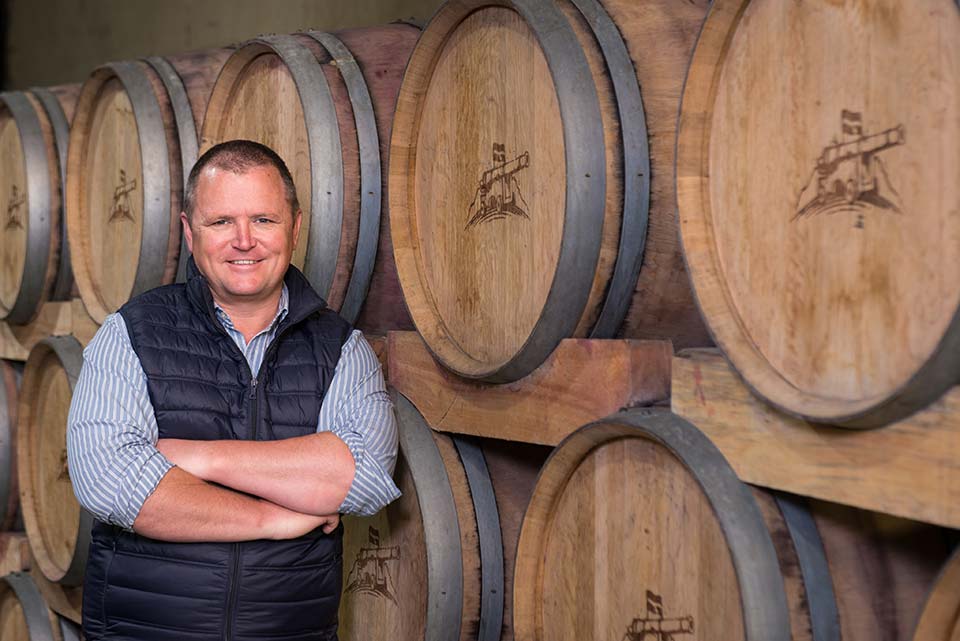
Abrie (above), who came to Kanonkop as Truter’s wingman and took over the top job in 2003, says this seamless thread “shows that Kanonkop is focused on terroir rather than my interpretation of what I think is good”.
Abrie sees his role as capturing the fingerprint of the farm’s soils and aspects and the vintage’s climate on the grapes, and steering it through vinification, maturation and bottling.
At Kanonkop, the grapes are generally harvested when sugar levels hit 23°-25° Balling, so long as:
- The skins present the correct degree of tannins;
- The acids are in balance with the sugar;
- The pips show development, without a taint of green.
In the cellar, the following protocol is followed:
- The handpicked grapes are tipped out of 18kg lug-boxes and into the destemmer.
- They are sorted by machine, vibrating table, and optical sorter.
- The crushed berries are pumped into shallow open-top concrete fermenters (each holding 10 tons) and inoculated. Being open and shallow means the wine loses about 0.5% alcohol and doesn’t get reductive.
- While the yeasts are beginning to multiply, there are manual punch-downs every two hours to ensure optimum yet delicate tannin and colour extraction before the alcohol takes over. With a fast fermenter like Pinotage, Abrie says you have to “extract what you need and then separate the skins from the juice”. Pinotage, a variety with high pH and malic acid, ferments on the skins for three days while Cabernet Sauvignon, Merlot and Cabernet Franc ferments on skins for 5-6 days.
- Most of the wine then goes into stainless-steel tanks, together with that pressed from the remaining skins.
- Some selected portions are sent directly to oak barrels.
- After malolactic fermentation (2-3 months), the wine goes through sterile filtration and into new or second-fill 225L French oak barrels for a maturation period of between 12-24 months, depending on the wine.
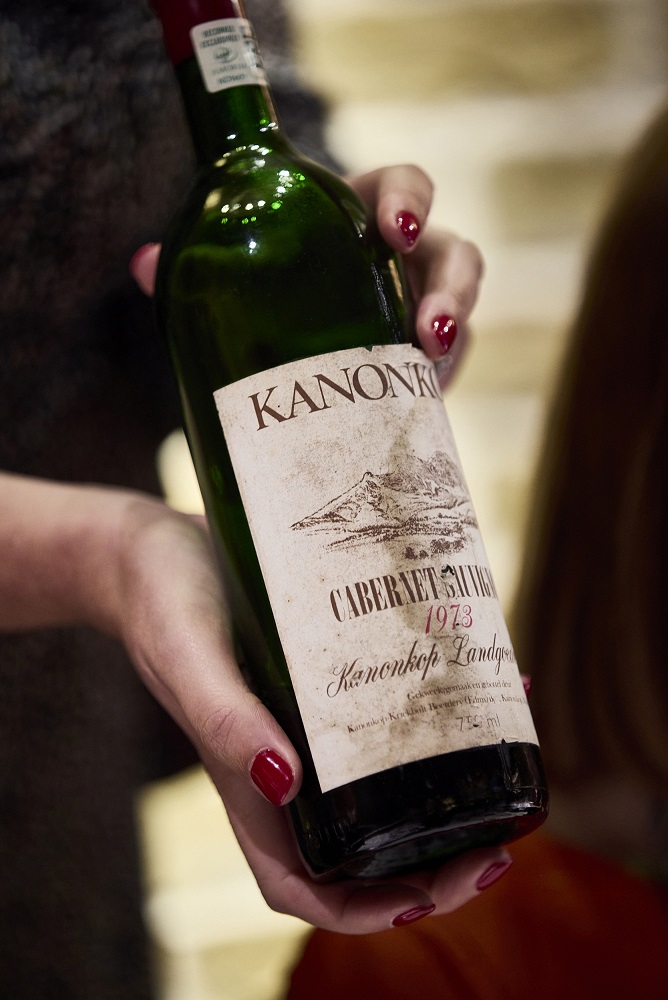
Although it’s fun to see how well the Pinotages and Cabernet Sauvignons have aged over the past four or five decades, I’m not here to dwell on the past – I want to know what is next for this 125ha farm in the Simonsberg region of Stellenbosch.
“At Kanonkop we have been doing a lot of things right for a long period of time, so it becomes second nature,” Abrie says. “It’s just part of what we do. But it becomes more relevant today as we have climatic change throughout the world.”
He’s talking about the sustainable practices that are helping to refine the wines even further. Having refined the winemaking over the past 20 years, it’s the logical next step.
He goes on to highlight the four pillars of their sustainability programme.
- Certified: All Kanonkop wine is certified by Sustainable Wine South Africa and a certification seal appears on each bottle.
- Ethical: Kanonkop supports ethical trade and is accredited by the Wine and Agricultural Trading Association, which actively promotes ethical trade in the wine industry through training, technical assessment and audits to assess members’ compliance with its code of good practice.
- Green energy: In 2017, Kanonkop embarked on a solar power-generation project to offset the rising electricity costs and combat the issue of loadshedding. The project was completed in September 2018, and now accounts for close to 50% of the estate’s daily power usage from its 156 kWp solar plant.
- Wines are suitable for vegans, vegetarians and pescatarians: Over the past ten years, Kanonkop has moved away from the use of animal-based additives for the fining processes (such as gelatine and albumin) and selected plant-based alternatives (such as potato protein). Kanonkop has also done extensive research on tannin additions to minimise the use of sulphur as a protective agent.
He illustrated his point with an aerial photo from 1958, when there was a great deal more woodland and natural habitat than shown in subsequent images from 1971 and 2022 – when almost all the land had been planted to vineyards. Then he showed this image (below) – their target for 2030.
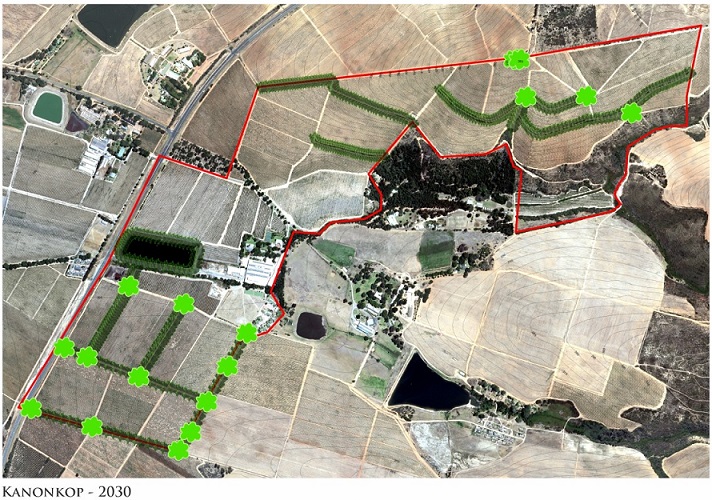
They are propagating indigenous fynbos to create a fynbos corridor between the vineyard blocks and replanting all the open spaces with native species, including wild peaches, to attract “all the natural life that’s supposed to be there. And that helps a lot, not only for making the farm look pretty but also for natural predators that can control all the negatives that we don’t want.”
They are also:
- Growing cover crops (to minimise herbicides, improve soil quality, help prevent erosion, increase microbial life, etc);
- Planting rye, which grows “quite high”, to protect the bush vines from the wind and suppress weeds;
- Conserving native species such as antelope, jackals, snakes and caracal;
- Using natural predators to control mealybugs and the spread of leaf roll virus;
- Removing virus-infected vines;
- Installing owl boxes for rodent control.
Another key aspect of their sustainable practices is investing in local people – improving their lives through education, skills development and community upliftment. Kanonkop provides work clothes to employees, transport for children, eye care, electricity during loadshedding and helps with maintenance to employees’ houses when required.
Abrie concludes: “You need the right people with the right attitude and right commitment to really take your business forward, and that means all the way through from the person that cuts the grass to the person that puts the wine in the bottle – through the whole spectrum. If you want to be a property that’s going forward, every part of that wheel needs to do its job and be part of the same vision of what we want to achieve. So, we’re very committed to our people and the children of our people. When the kids are happy, the parents normally are happy.”
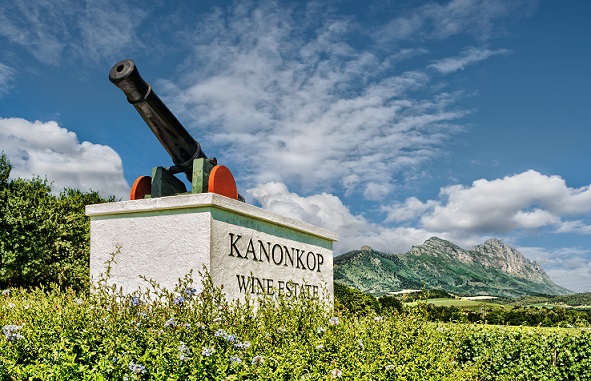

 English
English French
French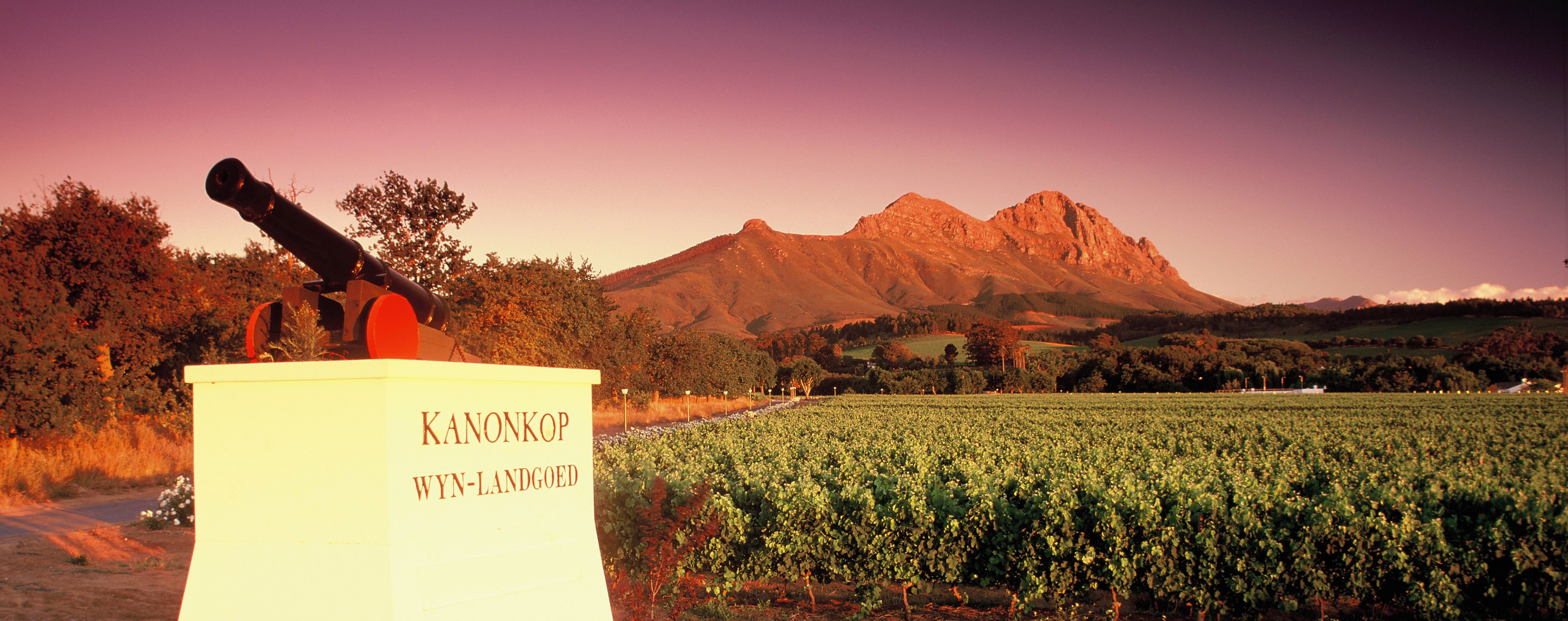







.png)


